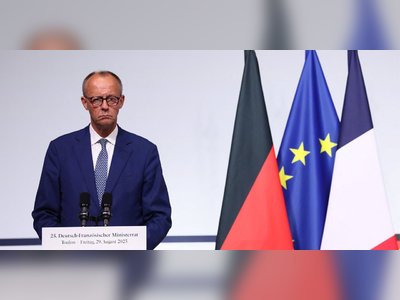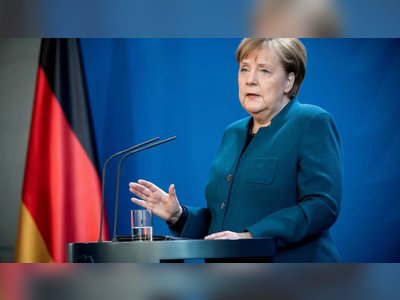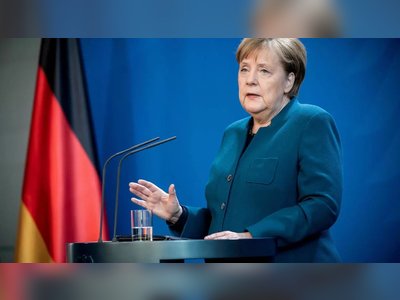
Friedrich Merz Leads Christian Democratic Union to Victory in German Election Amidst Rising Far-Right Influence
The CDU claims approximately 28.5% of the vote while the Alternative for Germany secures a record 20.6%, reshaping the political landscape in Germany.
BERLIN — Friedrich Merz’s conservative coalition, encompassing the Christian Democratic Union (CDU) and its Bavarian partner, the Christian Social Union (CSU), has emerged victorious in Germany’s recent national parliamentary election.
Most projections indicate that the CDU has secured roughly 28.5% of the vote, marking a significant shift in the country’s political dynamics and its return to power after years of coalition governance.
Merz declared victory shortly after preliminary results were shared at 6:30 p.m. local time, calling for the rapid formation of a new coalition government in light of global challenges.
He stated, "The world out there won’t wait for us, nor will it wait for lengthy coalition talks and negotiations." The election also saw the far-right Alternative for Germany (AfD) achieve unprecedented electoral performance, projected to receive about 20.6% of the total votes.
AfD’s candidate for chancellor, Alice Weidel, hailed the election outcome as a "historic success" and expressed a willingness to discuss coalition opportunities with the CDU.
However, Merz has reportedly dismissed the possibility of such discussions.
The incumbent Social Democratic Party of Germany (SPD), led by Chancellor Olaf Scholz, is anticipated to gather around 16.3% of the vote, marking its lowest electoral performance since rebranding in the 19th century.
The Green Party is projected to finish fourth with approximately 12.3% of the votes.
This election was expedited by the collapse of the SPD-led coalition just seven months before its scheduled date.
A total of 630 parliamentary seats are up for grabs, and these will be allocated proportionally based on the election outcomes.
The performance of smaller parties in the election will significantly impact the stability of the future coalition government.
The Left party is estimated to secure representation with 8.5%, while the Free Democratic Party (FDP) is on track to fall slightly below the critical 5% threshold, risking exclusion from parliament.
The ascent of Merz marks the first time a center-right leader has taken the chancellorship since Angela Merkel exited in 2021. During his campaign, Merz has aligned himself closely with the far-right, which has emerged as the largest opposition faction, nearly doubling its share since the last election.
This development raises pertinent questions regarding Germany’s political future and its impact on European dynamics, especially concerning ongoing tensions in transatlantic relations.
As official results become confirmed, the allocation of seats and the formation of the new government are expected to evolve, underscoring a critical moment for Germany amidst changing political forces.
Most projections indicate that the CDU has secured roughly 28.5% of the vote, marking a significant shift in the country’s political dynamics and its return to power after years of coalition governance.
Merz declared victory shortly after preliminary results were shared at 6:30 p.m. local time, calling for the rapid formation of a new coalition government in light of global challenges.
He stated, "The world out there won’t wait for us, nor will it wait for lengthy coalition talks and negotiations." The election also saw the far-right Alternative for Germany (AfD) achieve unprecedented electoral performance, projected to receive about 20.6% of the total votes.
AfD’s candidate for chancellor, Alice Weidel, hailed the election outcome as a "historic success" and expressed a willingness to discuss coalition opportunities with the CDU.
However, Merz has reportedly dismissed the possibility of such discussions.
The incumbent Social Democratic Party of Germany (SPD), led by Chancellor Olaf Scholz, is anticipated to gather around 16.3% of the vote, marking its lowest electoral performance since rebranding in the 19th century.
The Green Party is projected to finish fourth with approximately 12.3% of the votes.
This election was expedited by the collapse of the SPD-led coalition just seven months before its scheduled date.
A total of 630 parliamentary seats are up for grabs, and these will be allocated proportionally based on the election outcomes.
The performance of smaller parties in the election will significantly impact the stability of the future coalition government.
The Left party is estimated to secure representation with 8.5%, while the Free Democratic Party (FDP) is on track to fall slightly below the critical 5% threshold, risking exclusion from parliament.
The ascent of Merz marks the first time a center-right leader has taken the chancellorship since Angela Merkel exited in 2021. During his campaign, Merz has aligned himself closely with the far-right, which has emerged as the largest opposition faction, nearly doubling its share since the last election.
This development raises pertinent questions regarding Germany’s political future and its impact on European dynamics, especially concerning ongoing tensions in transatlantic relations.
As official results become confirmed, the allocation of seats and the formation of the new government are expected to evolve, underscoring a critical moment for Germany amidst changing political forces.
AI Disclaimer: An advanced artificial intelligence (AI) system generated the content of this page on its own. This innovative technology conducts extensive research from a variety of reliable sources, performs rigorous fact-checking and verification, cleans up and balances biased or manipulated content, and presents a minimal factual summary that is just enough yet essential for you to function as an informed and educated citizen. Please keep in mind, however, that this system is an evolving technology, and as a result, the article may contain accidental inaccuracies or errors. We urge you to help us improve our site by reporting any inaccuracies you find using the "Contact Us" link at the bottom of this page. Your helpful feedback helps us improve our system and deliver more precise content. When you find an article of interest here, please look for the full and extensive coverage of this topic in traditional news sources, as they are written by professional journalists that we try to support, not replace. We appreciate your understanding and assistance.











